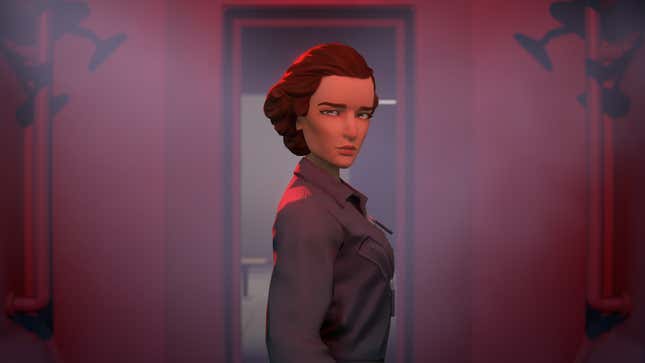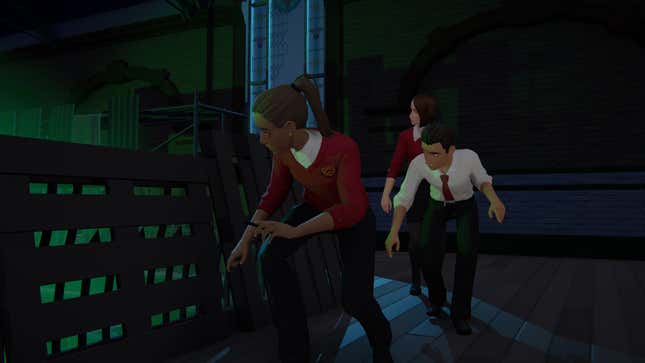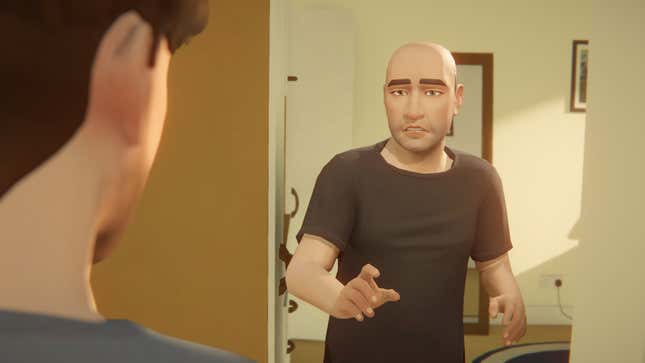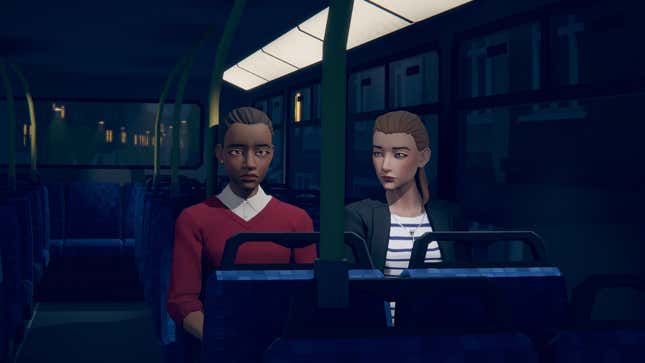
You’d think a game featuring mysterious green magic swirling in the London underground would be all about weird stuff. But Last Stop—at least from what I’ve seen of it so far—is first and foremost a game about people.
Last Stop is the latest from Variable State, the U.K. indie studio behind 2016’s oddball mystery Virginia, which notably told its story without dialogue. Like that game, Last Stop is a narrative-focused adventure with charming visuals, tight editing, and enough film references to fill a sizzle reel.
But that’s where the similarities end. For one thing, it’s a third-person game, not a first-person one. For another, it casts players as three characters, rather than one. Finally, the game features not just dialogue but a full vocal cast to support it.
“In addition to dialogue, we wanted to do interesting stuff with cameras, which is why we’ve gone from first-person to third-person,” Jonathan Burroughs, one of three co-directors on Last Stop, told me over a Zoom interview this week. “[These] have kind of gone hand-in-hand as ways to move beyond Virginia.”
First announced in 2019, Last Stop was among a slate of intriguing games to be published by indie mega-purveyor Annapurna Interactive. In November 2020, Annapurna pushed Last Stop—plus a handful of other titles—from a 2020 release to a broader 2021 window. (Last Stop is currently scheduled to come out in July for basically every platform. When asked, a representative for Annapurna declined to provide a specific release date.) Last week, I received a deeper look at the game during a digital press junket hosted by Annapurna, and was later provided with a beta build of Last Stop’s Steam version. Since embargo restrictions limit Kotaku from discussing anything that happens beyond the first chapter of each of Last Stop’s three stories, that’s as far as I’ve played. So far, I’m into it.
Last Stop’s narrative is split among three storylines, each featuring a different main character. But you can’t power through a single plotline in one go. Wrap up the first chapter for one storyline, and you’ll need to finish the first chapters of the other two before moving on, meaning players have to interact with all of the primary characters. Each storyline features six chapters, with each chapter lasting about 15 to 20 minutes, according to Variable State.
“We were eager to make the game easy to put down and pick up, like a TV show that can be watched over a couple of evenings,” Terry Kenny, one of Last Stop’s co-directors, told me in an email.

“Stranger Danger” stars Donna, a high school student. One night, Donna and her two best friends notice a man luring strangers into his home. Those strangers reportedly never exit his house, so the kids tail him, assuming he’s up to no good. They follow him to an abandoned facility, and quickly learn that, woah, there’s some supernatural shit going on with him. The kids try to run away but, instead, end up knocking out this man with apparent magical powers. Uh-oh.
“Paper Dolls” focuses on John, an overworked single father. John is also afflicted by a minor nuisance: the post keeps delivering his mail to a guy named Jack, who in turn keeps getting John’s mail. The chapter ends with a Freaky Friday-type body swap: John wakes up in Jack’s body—and, bonus, in his sumptuous apartment.
“Domestic Affairs” tells the story of Meena, a high-ranking employee at some sort of white hat agency. Of the three stories, “Domestic Affairs” grabbed me the most, entirely a result of Meena’s dark allure. (Kenny told me over a Zoom call this week that Meena was “probably” his favorite character as well.) Meena is, to put it nicely, kind of a jerk! She brushes her colleagues off. She cheats on her husband. She neglects her son, and bails on dinner with her dad. She very clearly does not have time for other people beyond considering what they can do for her.
“Most people, I would hope, don’t agree with decisions she’s making,” Lyndon Holland, one of Last Stop’s co-directors, told me over a Zoom call this week. “She’s not very nice to people. She’s, obviously, in the first chapter, she’s having an affair. ... And, I think the challenge was: Can we get away with that? Are people gonna accept that: role-playing a character [who’s] not a typical hero? She’s not a virtuous person. And we had a lot of fun writing that character.”
But Meena doesn’t just stand out for being the beguiling character. Of the three, Meena’s first chapter is the only opening chapter that notably does not feature supernatural elements.
“There’s sort of this strange mystery of having a story that seems more just like a standard kitchen-sink drama. But it does go places,” Holland assured me.
“We didn’t plan it that way on purpose, but as soon as we noticed, we didn’t try to fix it,” Kenny said.
If it wasn’t clear, Last Stop’s three stories are separate but intertwined. “These stories were sort of written as concepts in isolation,” Holland said. “As time went on, we thought, ‘That’s not good, we want to connect them all together.’”

In the first chapters, these interactions have been minimal. At one point in “Paper Dolls,” John finds himself waylaid at a Tube station, having just missed the train. Look closely at the background, and you’ll see Meena stroll by. “Paper Dolls” also features a brief run-in with an unnamed character who shows up in Last Stop’s prologue, set more than three decades before the main game. I’m looking forward to seeing how it all ties together.
Early on in development, Last Stop also featured a fourth story. It has since been cut. When pressed, the Variable State team wouldn’t reveal details beyond the fact that it was titled “Brain Freeze,” and that some characters, themes, and “vestigial remnants,” as Burroughs put it, have wormed their way into the three surviving storylines.
“The ghost of it lingers on,” Burroughs said.
So, how’s Last Stop play? Well, it’s an adventure game, so you probably have some idea of what to expect. You traverse third-person environments viewed from a fixed camera angle. You engage in the occasional quicktime event. You talk to non-player characters by selecting various dialogue options, but you only have a limited time to answer before… to be honest, I can’t tell you what happens. These conversations are so compelling—the people in Last Stop talk like real human people—that I haven’t dropped the ball once. I’m not typically one for adventure games (too slow), but the snappy nature of Last Stop’s chitchat, and how it demands constant attention, has kept me rapt.
What intrigued me most about Last Stop was its setting, which takes place in a fictionalized version of London’s outskirts. The game, perhaps obviously given its title, has a lot to do with trains. The prologue is set in the London underground. During the “Paper Dolls” storyline, you have to physically tap John’s Oyster Card to get into the Tube, which very well may be one of the most transit-forward actions I’ve ever had to perform in a video game.

According to Kenny, though London granted Variable State use of trademarks like the Tube signage, all of the stations in Last Stop are fictional. Still, NUMTOTs and urbanists will note clear inspirations.
“Our fictional ‘Potters Oak’ station is inspired by Stamford Brook Tube station, albeit flipped 180 degrees. ‘Cobbet Square Station’ in the game is a bit like South Kensington station. The ‘Salt Cellar Lane’ station takes cues from the architecture of Charles Holden, who designed many of the stations in the 1930s Piccadilly Line extension,” Burroughs told me in a follow-up email.
Most games treat transit networks as an afterthought. As a stalwart foot soldier in the eternal war on cars, I can’t tell you how nice it is to see a video game exhibit such clear care and understanding for how integral a working transportation network is to a functional city.
Ultimately, I’m not sure where Last Stop’s interconnected story is going, but I’m eager to ride it to–. Huh? Dammit. My editor tells me that I can’t make a “this is the last stop on this train” or a “mind the gap” pun. Sorry to let you down, all. I tried.
Last Stop comes out in July for PS4, PS5, Xbox One, Xbox Series X/S, Switch, and PC.

